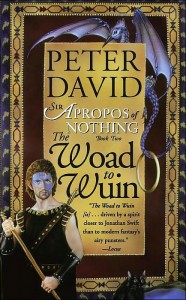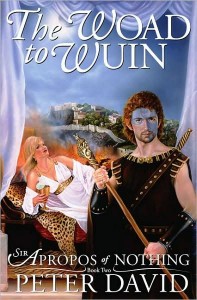
 Fortune’s own fool, destiny’s tool, the gods’ plaything, the antihero of the mythical Middle Ages, Sir Apropos of Nothing himself is back, in another gloriously epic tale of one man caught up in matters beyond his ken. Born to the lowliest of origins, the product of a gang of knights assaulting his prostitute mother, dedicated to the ideals of lying, cheating, scheming, wealth-seeking and self-preservation, lame of leg and cold of heart, Apropos is the last person anyone, including himself, would tap as a hero. Certainly, everytime he’s ever thought himself to be of importance, he’s turned out to be the bit player in someone else’s story. And when one tries to grab Fate by the horns, one can expect to get kneed in the groin for it, or so he might say.
Fortune’s own fool, destiny’s tool, the gods’ plaything, the antihero of the mythical Middle Ages, Sir Apropos of Nothing himself is back, in another gloriously epic tale of one man caught up in matters beyond his ken. Born to the lowliest of origins, the product of a gang of knights assaulting his prostitute mother, dedicated to the ideals of lying, cheating, scheming, wealth-seeking and self-preservation, lame of leg and cold of heart, Apropos is the last person anyone, including himself, would tap as a hero. Certainly, everytime he’s ever thought himself to be of importance, he’s turned out to be the bit player in someone else’s story. And when one tries to grab Fate by the horns, one can expect to get kneed in the groin for it, or so he might say.
After the events of Sir Apropos of Nothing, our reluctant hero has fled for parts unknown, eager to leave behind the many enemies and bad memories. After a small misadventure involving a band of dwarfs and a magic ring, Apropos escapes being pulled into other peoples’ stories, and sets himself up as the owner of a tavern called Bugger Hall. All’s quiet, right?
Wrong.
When the magic weaver known as Sharee, Apropos’ occasional ally, frequent foil, and on-again off-again enemy, shows up, trouble is right behind her. There’s the Visionary who’s written Apropos’ fate down on paper, the belligerent barbarian Lord Beliquose, and the mystic gem called the Eye of the Beholder. Just like that, with his tavern in flames, Apropos is thrust forth into the sort of adventures he truly hates. The sort involving underground kingdoms and the restless spectres of dead races. The sort involving barbarian lords tracking him. The sort that invariably include an arrow to the ass, and near-dying of hunger and thirst in the Tragic Waste. And all of that, mind you, is just the appetizer, as Apropos’ world turns topsy-turvy. When he wakes, months have passed. He’s strong, invincible, and the Peacelord of a vicious horde of warriors who have terrorized the land of Wuin. And he has no memory of how he could have gone from underdog to top dog, from self-professed coward to conqueror of nations. And what’s up with the beautiful Lady Kate, his beloved companion? When certain old enemies show up, it’s bound to get ugly. But is Apropos the star of his own epic at long last, or just an accidental bystander, again? One thing’s for certain: it won’t be dull.
Peter David is at his best writing three-dimensional, fully-realized, flawed characters. Apropos is a self-aware antihero, the sort of person whom no one in their right mind should ever trust, who balances distinct unpleasantness with all-too-familiar self-serving notions. It’s hard to hate Apropos for taking the easy way out when we can sympathize with him. He’s a bit of a sleaze, an opportunist, a cad, a rogue, and rather easily manipulated, not to mention easily tempted by power and motivated by revenge. So he’s no worse than the average politician or used car salesman, so what? He’s believable. He’s real. He’s pitiable to an extent. And he’s not afraid to admit his own failings, usually while he’s trying to escape a bad situation.
What could have been a simple parody of epic fantasy has instead been used to skewer the entire genre and roast it over the flames. There’s some pretty subtle commentary about the nature and existence not just of the heroes of these epics, but of the villains they go up against, and the poor schlubs caught in the middle. Right when The Lord of the Rings is big, it helps to have someone else come along and reduce it to half a dozen pages and point out how ridiculous it might seem from the average point of view. Don’t get me wrong; this isn’t some sly, underhanded, overly intelligent, occasionally mean, sometimes tragicomic satire of epic fantasy from one of the field’s more cunning writers — oh wait, maybe it is.
In the end, The Woad to Wuin is just what it seems: another great story from Peter David, and well worth the read. Once again, he delivers the goods, in a way very few others would even attempt.
